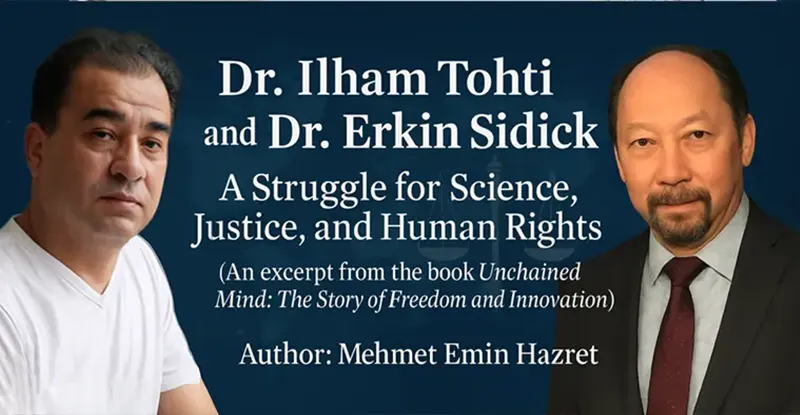
( An excerpt from the book “Unchained Mind: The Story of Freedom and Innovation”)
Author: Mehmet Emin Hazrat
Dr. Erkin Sidick: A Uyghur Intellectual in Service of Science and Human Rights
Dr. Erkin Sidick was born in Aksu, East Turkestan, and began his academic journey by earning a degree in Electrical Engineering from Xinjiang University. Between 1983 and 1988, he worked as a teacher and researcher in both China and Japan before moving to the United States to further his career.
He obtained a Master’s degree in Physics from California State University, Northridge in 1990 and completed his Ph.D. in Electrical Engineering at the University of California, Davis, in 1995. Specializing in optical and laser technologies, Dr. Sidick conducted postdoctoral research at UC Davis and Sandia National Laboratories (Livermore, CA). He later held positions as an engineering manager and senior R&D engineer at leading high-tech companies in Silicon Valley before joining NASA’s Jet Propulsion Laboratory (JPL) in 2004. At NASA, he played key roles in projects such as the Terrestrial Planet Finder Coronagraph (TPF-C) and other space telescope initiatives. To date, he has published over 130 scientific research papers and holds three patents.
Beyond Science: A Human Rights Advocate
Freedom and Captivity:
Dr. Sidick is equally recognized for his dedication to the Uyghur cause. Since the 1990s, he has published hundreds of articles encouraging Uyghur youth to pursue education and has assisted many Uyghur students in securing scholarships and academic opportunities abroad. In 1993, he founded the Tengri-tagh Overseas Uyghur Students and Scholars Association (TOSSA) in the United States to better organize and support Uyghur students from their homeland.
In addition, Dr. Sidick co-founded the Uyghur Academy in Istanbul, Turkey, on September 9, 2009, serving as its first honorary president until September 2013. His contributions helped advance Uyghur science and education, promote national enlightenment, and preserve Uyghur identity. When China intensified its policies against Uyghurs in 2017, Dr. Sidick refused to remain silent. He co-founded the Uyghur Torchlight Group, collaborating with diaspora intellectuals to expose China’s actions through campaigns and media interviews in English, German, Turkish, Chinese, Japanese, and Uyghur. By compiling firsthand evidence and presenting it to the international community, he has helped inform global audiences about the atrocities in East Turkestan.
To further prevent the erasure of Uyghur cultural identity, Dr. Sidick established the Uyghur Projects Foundation (UPF), which implements various programs to support the Uyghur diaspora and preserve their heritage. The Foundation aims to:
- Give voice to silenced Uyghurs on the global stage.
- Promote peace and intercultural dialogue.
- Preserve traditional Uyghur music, dance, and arts for future generations.
- Support Uyghur artists in expressing their identity through various art forms.
- Research and preserve traditional Uyghur medicine.
- Build academic bridges between the Uyghur diaspora and international research institutions.
- Organize summer programs to teach Uyghur youth their native language and cultural heritage.
- Serve the Uyghur community abroad through a monthly online journal and weekly video programs.
- Provide scholarships for Uyghur students from primary school to university.
As president of the UPF, Dr. Sidick continues to dedicate his expertise and leadership to serving his people, taking pride in contributing to the Uyghur cause.
Imprisoned Minds: Prof. Ilham Tohti – The Genius of the Uyghur People
Prof. Ilham Tohti was born in Artush, East Turkestan, and experienced a tragic childhood. At the age of two, his father was accused of “separatism” by Chinese authorities and perished in a concentration camp. Despite this early trauma, Tohti’s resolve to pursue education never wavered.
At 16, he achieved the highest score in Xinjiang on the national Chinese examination and was admitted to Central National University in Beijing. Even while facing institutional discrimination against Uyghur students, he excelled in a Chinese-language educational system, outperforming many Han Chinese peers. His exceptional intelligence and analytical skills quickly earned him respect in both Uyghur and broader academic circles.
Focusing on economics and law, Prof. Tohti critically analyzed China’s policies toward ethnic minorities. Through empirical research, he documented economic inequalities, systematic discrimination, and state oppression against the Uyghur people, emphasizing the constitutional rights enshrined in China’s Regional Ethnic Autonomy Law. His outspoken stance, however, made him a target of the state. Despite opportunities to remain abroad, Tohti chose to return to China to stand with his people. In 2014, he was arrested on separatism charges and subsequently sentenced to life imprisonment, during which he has reportedly endured severe physical and psychological torture.
The Stark Contrast: Freedom for Geniuses Dr. Erkin Sidick and Prof. Ilham Tohti represent two of the brightest minds of the Uyghur people. While Dr. Sidick thrives in a free society in the United States, achieving scientific breakthroughs and advocating for human rights, Prof. Tohti endures the severe consequences of dissent in China.
Their contrasting fates highlight the deep tragedy faced by the Uyghur community and serve as a powerful reminder of the value of democracy and freedom. This narrative challenges young intellectuals worldwide: Will you create and innovate in a free society, or remain silent under oppression?
Uyghur Intellectuals Targeted by Oppressive Regimes
Other Uyghur intellectuals have also suffered under harsh state policies:
- Prof. Dr. Abduqadir Jalalidin: A prominent poet, writer, and philosopher at Xinjiang Normal University, he was arrested at his home on January 29, 2018, and sentenced to life imprisonment in 2019.
- Yalqun Rozi: A respected writer and literary critic, he was arrested in 2016 and sentenced to more than 10 years in prison.
- Dr. Zulfiqar Barat Özbash: A sociologist who earned his Ph.D. in the United States, he was arrested in 2018 and sentenced to 15 years in prison for the “crime” of studying abroad.
Between 2017 and 2018, over 240 Uyghur intellectuals were detained, with many targeted for their international academic or professional engagements. Despite these repressive measures, history has shown that ideas cannot be imprisoned. The legacy of Uyghur intellectuals continues to inspire the struggle for justice and freedom.
